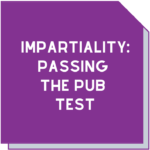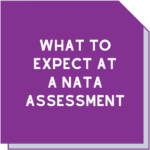12 Days of a Lab Christmas – Day 6
written by Maree Stuart
As we head into the silly season, we’re delighted to present:
The MAS Management Systems 12 Days of a Lab Christmas!

On the sixth day of Christmas, our field staff were given a gift from a client
It’s always nice when a client recognises the hard work of our staff.
But sometimes, those random acts of kindness might be inadvertently creating a desire to please. The question is, what does this do to a lab’s ability to act impartially?
What exactly is impartiality?
ISO/IEC 17025 defines impartiality as ‘presence of objectivity’. This means that conflicts of interest do not exist, or you can resolve them without adverse impact on the lab’s activities.
Philosophy Professor John Cottingham wrote that impartiality is linked with making a moral decision. This suggests that we should only adopt a neutral standpoint, ‘detaching ourselves as far as possible from our own special desires and involvements’. He argues that that this view is unsustainable (despite it being the prevailing view since well before the 18th Century), and it can lead to perverse, repugnant outcomes.
Think about it. Is it right that a person who is totally detached from the lab’s clients is making decisions about the samples, testing or results? That could lead to a poor relationship with clients, an ill-informed judgement on the quality of the test results, or worse.
Impartiality embodies the idea of being able to justify your decisions to the often discussed, but rarely seen, ‘person in the pub’. This is someone just like you with the same background, expertise, and circumstances.
In a similar vein as asking yourself, “Would my mother approve of this decision?” you can ask, “Would this pass the Pub Test?”.
So let’s unpack what you need to make this a useful principle to have in place.
What does ISO/IEC 17025 require?
In essence ISO/IEC 17025 asks labs to do several things:
- Undertake lab activities impartially
- Structure and manage the lab to safeguard impartiality
- Not allow commercial, financial, and other pressures to compromise impartiality
- Identify and eliminate or minimise risks to impartiality.
So here’s what you really need to do:
Set up your lab to minimise the possibility of conflict when people have to make those ‘irky’ decisions. The person responsible for deciding on whether a product or service can be released shouldn’t be the same as the one in charge of ensuring it is made. But I get it; sometimes that’s not possible, especially in small organisations. So….
Establish a review process. Transfer the decisions of approval or acceptance to another person in the organisation if at all possible. The chance of two people getting the decision wrong are smaller than if just one person makes these decisions. Lab QC and review of requests, contracts and reports are the perfect tools for this.
Get a clear idea of the people in your lab. Understand the relationships that exist with others inside and outside of the lab. Consider governance relationships too. If you don’t know, ask, but don’t make it an interrogation. Perhaps a questionnaire can help. Remember to explain the reasons why you’re asking these questions.
Run the relationships through your risk management system to determine if there are any significant risks above your risk threshold. If there are, put things in place to either eliminate or mitigate these risks. Make sure you can demonstrate how you dealt with these risks to impartiality to an auditor.
Lastly, think about the culture of your lab. Is it one where anything goes? Is it one where people feel able to disclose that feeling in the pit of their stomach when they feel uncomfortable? The latter, as opposed to the former, is what you should be aiming for.
What can you do, as a lab manager or staff member, to encourage the right kind of culture? Can you demonstrate your organisation’s values in your everyday work? (Do you even know what these values are?) Can you use things like the quality policy, structure and content of any management and staff meetings to drive a culture where you can safeguard impartiality? If you can’t answer these questions to your satisfaction, then perhaps there is more work to do in the culture arena.
Do I really need to go this far?
Of course, the above steps don’t mean that things won’t pop up from time to time that make you go ‘hmmmm’. Things like accepting unexpected gifts from clients.
Play it safe, follow the steps above and you can’t go wrong when it comes to accreditation or protecting your reputation. Even though you might not think it’s a risk to impartiality by the simple acceptance of the beer economy currency by your staff (or whatever gift you receive this Christmas), individual interpretations of what these gifts really are asking for in return can vary.
If you’re not sure or you want a second opinion, we can help!
Phone Maree on 0411 540 709 or email info@masmanagementsystems.com.au and we can arrange a confidential conversation on the ethical dilemmas presented by unexpected gifts and other potential threats to impartiality.
Remember, you don’t have to do this alone!






